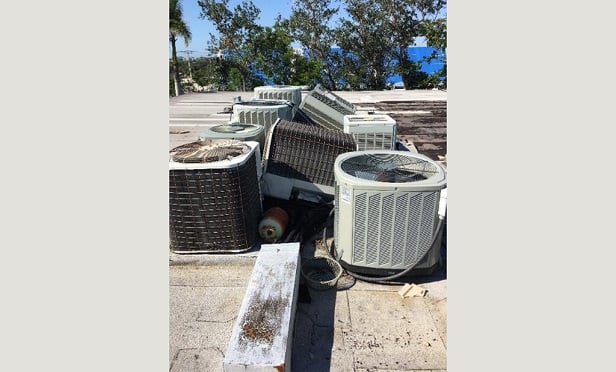It's easy to understand why hurricanes have such a bad reputation compared to other thunderstorms. The images of large, rotating storms created over the warm, tropical waters can be alarming, especially factoring in the minimum 74 mph winds and the storms' erratic paths. They can impact anything in their way, including residential and commercial HVAC systems. But insurance professionals shouldn't assume a hurricane is the cause for all HVAC system damage during that timeframe because there are issues to look for and to be wary of following a storm.
|Condensing unit takes the brunt
Hurricanes and tropical storms cause more costly damage than inland storms because of flooding from heavy rains and storm surges and damage from hurricane-force winds. A 2019 report from the Congressional Budget Office estimates that expected annual economic losses from most types of damages caused by hurricane winds and storm-related flooding total $54 billion for households, commercial businesses and the public sector.
Hurricanes, depending on their category, can have wind speeds of 74 mph to upward of 157 mph, according to the National Hurricane Center. It's no wonder that wind is the main concern related to HVAC systems.
 Condensing units on HVAC split-systems have multiple components prone to hurricane damage. (Photo: HVACi)
Condensing units on HVAC split-systems have multiple components prone to hurricane damage. (Photo: HVACi)
Recommended For You
Want to continue reading?
Become a Free PropertyCasualty360 Digital Reader
Your access to unlimited PropertyCasualty360 content isn’t changing.
Once you are an ALM digital member, you’ll receive:
- Breaking insurance news and analysis, on-site and via our newsletters and custom alerts
- Weekly Insurance Speak podcast featuring exclusive interviews with industry leaders
- Educational webcasts, white papers, and ebooks from industry thought leaders
- Critical converage of the employee benefits and financial advisory markets on our other ALM sites, BenefitsPRO and ThinkAdvisor
Already have an account? Sign In Now
© 2025 ALM Global, LLC, All Rights Reserved. Request academic re-use from www.copyright.com. All other uses, submit a request to [email protected]. For more information visit Asset & Logo Licensing.








